Adaptogens (Ashwagandha, Rhodiola) for Stress-Related Dissociation
Introduction
When life feels like too much, your mind and body sometimes do something extraordinary — they disconnect. Dissociation is not a failure or weakness; it’s a biological safety mechanism. When stress, trauma, or emotional overload overwhelm the nervous system, the brain protects you by shutting down parts of awareness. You feel distant, foggy, detached from your body, or emotionally flat — as if life is happening through glass.
But when this protective state becomes chronic, it stops being helpful. You can’t feel joy, you lose track of time, and the world seems muted. Healing from dissociation means helping your nervous system rediscover safety — learning that presence doesn’t mean danger.
Among the most promising natural allies for this process are adaptogens — herbs that help the body adapt to stress and restore balance. Two of the most researched are Ashwagandha (Withania somnifera) and Rhodiola rosea. These ancient plants modulate stress hormones, stabilize energy, and balance neurotransmitters. Over time, they can help reduce the physiological chaos that fuels dissociation, allowing you to return to calm, focus, and embodied awareness 🌸.
Looking for supplements for This? Click here.
Dissociation and the Stress System: A Survival Mechanism on Overload 🧠

To understand how adaptogens help, it’s crucial to grasp what happens during dissociation. Under acute stress, your body activates the sympathetic nervous system — the “fight or flight” response. Adrenaline and cortisol surge, increasing heart rate and alertness.
But if the stress is too intense or prolonged, your body can’t sustain that energy. The parasympathetic nervous system (specifically the dorsal vagal complex) takes over, leading to shutdown — a freeze state. Blood pressure drops, awareness narrows, and emotion shuts off.
This oscillation — between hyperarousal and collapse — is the hallmark of trauma-related dissociation. Your system becomes trapped in survival mode, alternating between alarm and numbness.
The HPA axis (hypothalamic-pituitary-adrenal axis) — the hormonal communication line that controls stress responses — becomes dysregulated. Cortisol may spike uncontrollably or drop too low, leaving you fatigued and foggy. Neurotransmitters like serotonin, dopamine, and GABA also fall out of balance, impairing mood, focus, and sensory integration.
That’s why dissociation isn’t “just in your head.” It’s biochemical and hormonal — and this is exactly where adaptogens can help.
What Are Adaptogens? 🌿
Adaptogens are a class of plant compounds that enhance the body’s resilience to stress. They don’t sedate or stimulate; instead, they normalize. When cortisol is too high, they lower it. When it’s too low, they raise it. They act as “thermostats” for your stress system, helping you maintain equilibrium.
This ability to modulate rather than push makes them ideal for people recovering from dissociation, where both overactivation and underactivation can coexist. Adaptogens work gradually — restoring the body’s capacity to respond to stress without collapsing or shutting down.
Of all adaptogens, two stand out for their effect on the mind-body connection and stress hormones: Ashwagandha and Rhodiola. Let’s look at how each one supports cognitive clarity, emotional balance, and presence.
Ashwagandha: The Grounding Adaptogen 🌱
A Traditional Tonic for Modern Nervous Systems
Ashwagandha has been used for over 3,000 years in Ayurvedic medicine as a rasayana — a rejuvenating herb that promotes vitality and emotional calm. The name itself means “smell of the horse,” referring to its traditional association with strength and grounding.
Modern research shows that ashwagandha helps regulate cortisol, enhance GABA receptor activity, and stabilize thyroid and adrenal function — all essential for emotional regulation and stress resilience.
For someone with dissociation, ashwagandha’s effects are deeply relevant. When chronic stress leaves you wired but exhausted, anxious yet numb, this herb helps reconnect the nervous system to a stable baseline.
How Ashwagandha Supports Stress-Related Dissociation
Balancing Cortisol: Chronic trauma often keeps cortisol irregular — high in the morning, low at night, or vice versa. Ashwagandha gently restores circadian cortisol rhythm, improving energy in the morning and calmness at night. Studies show reductions of up to 30% in cortisol levels after consistent supplementation.
Enhancing GABA and Serotonin: Ashwagandha increases the activity of GABAergic neurons — the brain’s natural calming network — without sedation. It also boosts serotonin, improving mood stability and reducing emotional numbness. This dual effect can help the brain stay alert without tipping into panic.
Reducing Hyperarousal: In people with PTSD-like symptoms, ashwagandha has been shown to decrease anxiety, restlessness, and insomnia by normalizing sympathetic nervous system activity. The heart rate slows, breathing deepens, and presence returns.
Supporting Body Awareness: Ashwagandha’s grounding effect is both physiological and psychological. Many describe feeling more “in” their body — less detached, more capable of sensing subtle emotions and sensations without overwhelm.
Looking for supplements for This? Click here.
The Science Behind the Calm
A 2012 randomized controlled trial published in Indian Journal of Psychological Medicine found that participants taking 300 mg of ashwagandha root extract twice daily reported significant reductions in stress and anxiety compared to placebo. Cortisol levels dropped, sleep quality improved, and emotional stability increased.
Further studies show improved cognition and memory, suggesting that ashwagandha enhances hippocampal neurogenesis — the growth of new neurons in the part of the brain most damaged by chronic stress. This is the same region involved in memory, identity, and spatial orientation — functions often disrupted in dissociation.
By supporting hippocampal repair and stress regulation, ashwagandha helps the brain rebuild the foundations of presence. 🌿
Rhodiola Rosea: The Revitalizing Adaptogen 🌸
From Numbness to Mental Clarity
While ashwagandha calms and grounds, Rhodiola rosea uplifts and energizes. Native to cold, high-altitude regions like Siberia and Scandinavia, it has been used for centuries to fight fatigue, enhance mental clarity, and improve stress endurance.
In dissociation, where mental fog and fatigue often dominate, Rhodiola helps reignite mental focus without overstimulation. It strengthens communication between the amygdala, prefrontal cortex, and hippocampus, restoring the neural integration necessary for clear thinking and emotional processing.
How Rhodiola Supports the Dissociative Brain
Regulating Cortisol and Energy: Rhodiola fine-tunes cortisol release much like ashwagandha but with a slightly stimulating edge. It prevents cortisol from spiking too high during stress and helps sustain steady energy throughout the day.
Increasing Dopamine and Serotonin: Rhodiola enhances the synthesis of dopamine and serotonin, key neurotransmitters for motivation and mood. This is particularly helpful for people who feel emotionally flat or unmotivated during dissociative episodes.
Protecting Neurons from Stress Damage: Rhodiola increases cellular resilience by boosting ATP production (energy within cells) and activating antioxidant enzymes that reduce oxidative stress in the brain. Chronic stress depletes neuronal energy reserves; Rhodiola helps replenish them, allowing neurons to communicate efficiently again.
Enhancing Cognitive Function: Multiple studies show that Rhodiola improves mental performance under stress — reaction time, memory, and focus all benefit. For someone who feels foggy or disconnected, this translates to sharper thinking and stronger executive control, helping the mind “stay online.”
Rhodiola’s Role in Emotional Reconnection
In dissociation, emotional awareness often feels turned off — like the volume knob on life has been dialed down. Rhodiola gently turns that dial back up. By stabilizing neurotransmitter activity and increasing cerebral blood flow, it helps restore emotional color and nuance.
Some people describe feeling more emotionally “alive” yet stable after consistent use. The world regains vibrancy; motivation returns. This reawakening is subtle but powerful — it’s the biological foundation for reconnecting with one’s inner world.
Ashwagandha vs. Rhodiola: Two Paths Toward Presence ⚖️
Ashwagandha and Rhodiola have complementary personalities. One calms; the other clarifies. One roots you into the body; the other sharpens the mind.
For dissociation, they can work synergistically: ashwagandha restores safety and emotional grounding, while Rhodiola brings cognitive energy and alertness back online. Together, they form a balanced adaptogenic duo — the yin and yang of nervous system recovery.
In practical terms, ashwagandha is best taken in the evening or before bed for relaxation, while Rhodiola works well in the morning to enhance focus and motivation. Both regulate cortisol rhythm and improve adaptability to stress, but their energies complement rather than compete.
Over time, their effects compound: you feel both centered and awake — a state dissociation often erases.
Adaptogens and the HPA Axis: Resetting the Stress Thermostat 🔄

At the root of chronic dissociation lies an exhausted or dysregulated HPA axis. When the hypothalamus, pituitary, and adrenal glands miscommunicate, your body loses its ability to modulate stress efficiently.
Ashwagandha and Rhodiola repair this communication loop. They act as HPA axis modulators, fine-tuning cortisol release and improving receptor sensitivity. When the system is stable, your body no longer has to choose between hyperarousal and shutdown.
Clinical research shows that both herbs reduce ACTH (adrenocorticotropic hormone), a signal from the pituitary that tells the adrenals to release cortisol. Lower ACTH means a calmer stress response, fewer adrenaline spikes, and smoother recovery after emotional triggers.
As your stress system stabilizes, the nervous system becomes more resilient. The body learns: “I can experience stress without needing to dissociate.” That’s real biological healing.
The Role of Adaptogens in Brain Plasticity 🌱🧠
Trauma and chronic stress damage synaptic plasticity — the brain’s ability to adapt and reorganize. Adaptogens counter this effect by promoting neurogenesis and BDNF (Brain-Derived Neurotrophic Factor), a protein that helps neurons grow and connect.
Ashwagandha has been shown to increase dendritic branching in hippocampal neurons — literally strengthening the brain’s capacity for memory and emotional integration. Rhodiola boosts BDNF in the prefrontal cortex, enhancing mood regulation and executive function.
These effects are not instant; they unfold over weeks and months, gradually rewiring the brain for resilience. As neuroplasticity improves, the mind becomes more flexible, capable of processing sensations and emotions without retreating into detachment.
Combining Adaptogens with Mind-Body Practices 🌬️
Adaptogens create a biochemical environment conducive to healing, but presence must also be practiced. When combined with mindfulness, breathwork, or trauma-informed therapy, their effects deepen.
Ashwagandha helps calm the body during grounding exercises — you can feel sensations without triggering alarm. Rhodiola sharpens focus during meditation, helping you maintain awareness without drifting.
Breathwork, yoga, or gentle movement further enhance their impact by stimulating the vagus nerve — the communication highway between brain and body. Adaptogens and breathwork together promote vagal tone, creating a feedback loop of calm: a relaxed body sends “safe” signals to the brain, and the brain responds with presence instead of dissociation.
How to Use Adaptogens Safely 🌿💧
Ashwagandha and Rhodiola are generally safe when used in moderate doses, but they have different energy profiles.
Ashwagandha is typically taken in doses of 300–600 mg per day of a standardized root extract (containing 5% withanolides). It works best when taken consistently, as its effects build gradually.
Rhodiola is often taken in doses of 200–400 mg per day of an extract standardized to 3% rosavins and 1% salidroside. Start low, as Rhodiola can be mildly stimulating in some people.
Combining both can provide full-spectrum stress support — grounding plus clarity — but it’s wise to introduce one at a time. As with all supplements, it’s best to consult a healthcare provider, especially if you’re taking medications for thyroid, blood pressure, or mood regulation.
The Emotional Evolution: From Numbness to Connection 🌈
Healing from dissociation is like thawing ice — it’s slow, sometimes messy, but always a return to life. Adaptogens help this process at the most fundamental level: they rebuild the body’s trust in balance.
As cortisol stabilizes, neurotransmitters harmonize, and inflammation decreases, the nervous system begins to relax its grip on dissociation. You might notice small changes first — a little more energy, more vivid dreams, emotions returning in gentle waves.
These are signs that your biology is remembering presence. Adaptogens don’t force change; they create the conditions for it. Over time, your system learns that it no longer needs to retreat into numbness to stay safe. Calm can exist alongside awareness.
The result isn’t just less dissociation — it’s deeper self-regulation, a renewed sense of vitality, and the quiet confidence that you can face life without shutting down. 🌞
Conclusion ✨
Dissociation is a body-brain survival response — a testament to your nervous system’s brilliance in protecting you from harm. But long after the danger has passed, those same protective patterns can keep you disconnected from yourself.
Adaptogens like Ashwagandha and Rhodiola offer a way to gently restore balance from the inside out. They don’t override your biology — they teach it balance again. By regulating cortisol, supporting neurotransmitter harmony, and rebuilding brain plasticity, they help transform stress from something that fractures you into something you can flow through.
Healing dissociation means reconnecting — to your body, your emotions, and your environment. And while adaptogens are not magic bullets, they can be powerful companions on the journey. Each cup of calm, each breath of awareness, each small biochemical shift is a message to your nervous system: You are safe. You can stay. 🌿💫
Looking for online therapy ? Click Here.
References
Panossian, A., & Wikman, G. (2010). “Effects of adaptogens on the central nervous system and the molecular mechanisms associated with their stress–protective activity.” Pharmaceuticals, 3(1): 188–224.
Chandrasekhar, K., et al. (2012). “A prospective, randomized study on ashwagandha root extract and stress.” Indian Journal of Psychological Medicine, 34(3): 255–262.
Darbinyan, V., et al. (2000). “Rhodiola rosea in stress-induced fatigue.” Phytomedicine, 7(5): 365–371.
Lopresti, A. L., et al. (2019). “The effects of adaptogens on HPA axis function.” Phytotherapy Research, 33(12): 3151–3171.
Gerbarg, P. L., & Brown, R. P. (2016). “Mind-body practices and adaptogens in trauma recovery.” Annals of the New York Academy of Sciences, 1373(1): 66–77.
Lanius, R. A., et al. (2018). The Neurobiology and Treatment of Trauma-Related Dissociation. Routledge.
Panossian, A., & Brendler, T. (2020). “Adaptogens: Stress protectors and metabolic regulators.” Phytotherapy Research, 34(5): 1070–1091.
Vgontzas, A. N., et al. (2003). “Sleep and stress hormones in PTSD and dissociation.” Psychoneuroendocrinology, 28(5): 509–528.
Singh, N., et al. (2011). “Neuroprotective and anti-stress effects of ashwagandha.” African Journal of Traditional Complementary and Alternative Medicine, 8(5S).
Spasov, A. A., et al. (2000). “Effects of Rhodiola extract on mental performance and fatigue.” Phytomedicine, 7(2): 85–89.
Related Posts
-
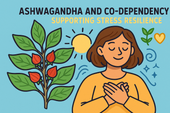
Ashwagandha and Co-Dependency: Supporting Stress Resilience
Stress is more than a feeling—it’s a full-body signal that your system is overwhelmed. When the mind races and the body tenses, your hormones, breathing, and focus all shift into survival mode. Chronic stress doesn’t just affect emotions—it reshapes your nervous system, drains your energy, and clouds your clarity. Learning to understand and manage stress gently is the first step toward peace, balance, and true recovery. 🌿💫
-

Why Co-Dependency Feels Draining: Adrenal Fatigue and Supplements That Help
The adrenal glands are small but powerful organs that sit above your kidneys, acting as your body’s built-in stress managers. They produce hormones like cortisol and adrenaline that help regulate energy, mood, and resilience. When they’re overworked from chronic stress or emotional exhaustion, fatigue and imbalance follow. Supporting adrenal health naturally can help restore calm, energy, and hormonal balance. 🌿⚡
-

The Link Between Anxiety, Co-Dependency, and Natural Support
Anxiety feels like living in constant alert mode—your heart races, your thoughts loop, and your body can’t find peace. It’s the nervous system’s way of preparing for danger, even when none exists. Understanding what’s happening in your mind and body is the first step toward calming the storm and restoring balance. 🌿💫
-

Supplements That Support Dopamine and Serotonin in Co-Dependent Patterns
Serotonin is the neurotransmitter of calm, confidence, and contentment. When it’s balanced, you feel peaceful and emotionally grounded. When it’s low, anxiety, mood swings, and emotional dependence take over. By understanding serotonin’s role in emotional health—and how to support it naturally—you can rebuild inner stability, improve relationships, and cultivate lasting happiness from within. 🌞💫
-

How Emotional Exhaustion in Codependency Impacts the Nervous System
The nervous system is the body’s communication network, connecting the brain to every organ and muscle. It regulates stress, mood, and emotion through a delicate balance of electrical and chemical signals. When overwhelmed, it can become dysregulated—leading to fatigue, anxiety, and emotional imbalance. Understanding how to calm and strengthen the nervous system is key to healing from chronic stress and emotional burnout. ⚡🌿
-

What Is Co-Dependency? The Role of Brain Chemistry and Stress
Stress is more than a feeling—it’s a full-body experience that begins in the brain and ripples through every cell. When cortisol surges and the nervous system stays on alert, your body can’t rest or recover. Over time, this constant tension affects energy, focus, mood, and even immune health. Understanding stress chemistry is the first step toward breaking free from burnout and finding calm again. 🌿
-

Creating a Supplement Stack for Motivation, Energy, and Anti-Procrastination
Motivation is the fuel behind every meaningful achievement—but it’s not just about willpower. It’s a mix of mindset, brain chemistry, and momentum. When energy, focus, and purpose align, action feels natural instead of forced. Learn how to harness motivation as a daily state, not a fleeting feeling.
-

Supplements for Building Consistency and Reducing Chronic Procrastination
Biochemistry is the bridge between biology and chemistry—the science of life at the molecular level. It explains how nutrients, hormones, and neurotransmitters interact to create energy, thought, and emotion. From brain function to muscle movement, biochemistry reveals the invisible processes that sustain health, balance, and vitality.
-

GABA and Procrastination: Supporting Calm Focus for Productivity
GABA is the brain’s natural calming messenger—a neurotransmitter that helps slow mental overactivity and ease stress. When GABA levels drop, focus fades, anxiety rises, and procrastination becomes more likely. By supporting GABA through nutrition, lifestyle, and supplements, you can restore calm clarity, improve focus, and take action with steady, balanced energy.
-

Ashwagandha and Procrastination: Lowering Stress to Improve Action
Science is the language of curiosity and discovery. It helps us understand the hidden patterns behind life, energy, and the universe. Through experimentation and critical thinking, science connects imagination to evidence—turning questions into knowledge. Whether through microscopes, molecules, or minds at work, science represents our endless pursuit of truth and innovation.
-

Neurotransmitters and Motivation: Supplements That Support Drive and Focus
Supplements can do more than boost physical health—they can also enhance mental clarity, focus, and motivation. Nutrients like omega-3s, magnesium, B vitamins, and adaptogens help balance neurotransmitters, stabilize mood, and support brain energy. When combined with good sleep, nutrition, and mindful habits, they can transform how your brain performs under stress.
-

How Stress Hormones Like Cortisol Fuel Procrastination (and What Helps)
Blood sugar isn’t just about physical health—it directly impacts focus, mood, and motivation. When glucose levels spike and crash, energy and attention do the same, fueling procrastination and brain fog. Learning how to stabilize blood sugar through balanced meals, mindful habits, and key nutrients helps keep your mind steady, focused, and ready to act.
-

Brain Fog and Procrastination: Supplements for Mental Clarity
Brain fog can turn even simple tasks into mental hurdles. When your thoughts feel slow and unclear, procrastination often follows—making focus and productivity seem impossible. This article explores the biochemical and lifestyle causes of brain fog and reveals the most effective supplements for restoring mental clarity, focus, and sustained energy.
-

The Link Between Low Energy and Procrastination: Can Supplements Help?
Neurochemistry shapes how we think, feel, and act. When neurotransmitters like dopamine, serotonin, and GABA fall out of balance, it can lead to fatigue, anxiety, or lack of motivation—fueling procrastination and low mood. Understanding the brain’s chemical communication system helps us find ways to restore focus, calm, and emotional stability through nutrition, mindfulness, and targeted supplements.
-

Why Do We Procrastinate? The Role of Dopamine and Supplements That Support It
Dopamine is the brain’s motivation messenger—the chemical that fuels focus, reward, and drive. When dopamine levels drop, even simple tasks can feel impossible to start. This article explores how dopamine shapes procrastination, motivation, and mental energy, along with natural supplements and daily habits that help restore balance and get things done.
-

Phosphatidylserine and Stress Reduction for People with BDD
Stress is more than a mental state—it’s a full-body experience that affects hormones, brain chemistry, and emotional balance. For people with Body Dysmorphic Disorder (BDD), constant tension and worry about appearance can overload the nervous system. Learning how stress works and finding ways to calm it is key to breaking the cycle of anxiety and self-criticism.
-

How Antioxidants Like Vitamin C & E Support Mental Health in BDD
Antioxidants are the body’s natural defense against stress and inflammation. For people with Body Dysmorphic Disorder (BDD), oxidative stress can worsen fatigue, anxiety, and emotional imbalance. Nutrients like Vitamin C and E help protect brain cells, boost neurotransmitter function, and support a calmer, clearer mindset—building a stronger foundation for recovery.
-

Ginkgo Biloba and Memory Support for BDD Recovery
Emotional regulation is the foundation of healing from Body Dysmorphic Disorder (BDD). When the nervous system stays in constant overdrive, even small stressors can trigger self-critical spirals. Learning to calm emotional reactivity helps restore clarity, confidence, and a sense of inner balance. By blending mindfulness, nervous system support, and self-compassion, you can retrain your brain to respond—not react—to emotion.
-

Alpha GPC and Cognitive Function in Body Dysmorphic Disorder
Mental fatigue can feel like your brain has hit a wall—thoughts slow down, focus fades, and motivation disappears. For people with Body Dysmorphic Disorder (BDD), chronic overthinking, emotional stress, and constant self-evaluation can deplete mental energy even further. Understanding what causes this cognitive exhaustion is the first step toward recovery—through rest, balanced nutrition, and targeted brain-supporting supplements.
-

N-Acetyl L-Tyrosine and BDD: Supporting Mental Clarity
Chronic stress doesn’t just affect your mood—it reshapes your brain chemistry, weakens focus, and fuels the obsessive thought loops common in Body Dysmorphic Disorder (BDD). Over time, constant cortisol elevation drains mental energy and emotional balance. Learning to recognize and manage chronic stress is essential to restoring mental clarity, self-compassion, and resilience.
-

Chamomile and Lavender for Calming Obsessive Body Image Thoughts
The nervous system is the command center of our emotional and physical world—and in Body Dysmorphic Disorder (BDD), it often operates in overdrive. Understanding how the brain and body communicate under stress reveals why intrusive thoughts feel uncontrollable. Learning to regulate the nervous system through calm practices, nutrition, and supplements helps restore inner balance and emotional safety.
-

Adaptogens for Body Dysmorphic Disorder: Rhodiola, Ginseng, and More
Rhodiola rosea, often called the “golden root,” is an adaptogenic herb renowned for boosting stress resilience and mental endurance. For individuals with Body Dysmorphic Disorder (BDD), Rhodiola may help reduce fatigue, regulate cortisol, and enhance emotional balance. By supporting both mind and body, this powerful plant promotes calm focus, improved mood, and renewed energy to face daily challenges.
-

B Vitamins for Stress Resilience in BDD: Rebuilding Calm from Within
Biochemistry is at the heart of every thought, emotion, and reaction we experience. In Body Dysmorphic Disorder (BDD), chemical imbalances in neurotransmitters like serotonin, dopamine, and GABA can amplify stress and distort self-perception. Understanding the biochemistry behind mood and stress regulation offers a path toward healing—bridging the gap between emotional experience and the body’s molecular balance.
-

Melatonin and Body Dysmorphic Disorder: Restoring Healthy Sleep Patterns
Melatonin, the body’s natural sleep hormone, plays a vital role in helping people with Body Dysmorphic Disorder (BDD) restore healthy sleep cycles. When anxiety and obsessive thinking interfere with rest, melatonin levels often drop, leading to more emotional reactivity and distorted self-perception. This article explores how melatonin works, why BDD disrupts it, and how natural supplementation—combined with mindful routines—can help the brain and body finally find calm at night.
-

Sleep Struggles with BDD: Supplements for Rest and Recovery
When you’re living with Body Dysmorphic Disorder (BDD), restful sleep can feel impossible—but the right supplements can help reset your body’s natural rhythm. From magnesium and L-theanine to 5-HTP and ashwagandha, these nutrients support relaxation, lower cortisol, and enhance melatonin production. This article explores how supplements can calm the mind, ease nighttime anxiety, and promote true restorative sleep for emotional and physical recovery.
-

5-HTP and Serotonin Balance: Could It Help with Body Dysmorphic Disorder?
Anxiety can feel like a storm inside the mind—restless, overwhelming, and hard to control. In people with Body Dysmorphic Disorder (BDD), anxiety often fuels obsessive thoughts and self-criticism, creating a painful cycle of worry and self-doubt. This article explores the biological roots of anxiety, the role of neurotransmitters like serotonin and GABA, and how natural strategies such as mindfulness, supplements, and nervous system regulation can restore calm and mental clarity.
-

Can Ashwagandha Help Ease Stress and Anxiety in Body Dysmorphic Disorder?
Neurotransmitters like serotonin, dopamine, GABA, and acetylcholine are the chemical messengers that shape how we think, feel, and react to stress. In Body Dysmorphic Disorder (BDD), imbalances in these neurotransmitters can amplify anxiety, obsessive thinking, and emotional distress. This article explores how restoring healthy brain chemistry through nutrition, supplements, and mindfulness can help bring clarity, calm, and emotional stability.
-

L-Theanine for BDD: Finding Calm in the Mind
Neurochemistry plays a central role in how we think, feel, and see ourselves. For those living with Body Dysmorphic Disorder (BDD), imbalances in neurotransmitters like serotonin, dopamine, and GABA can intensify anxiety, obsessive thoughts, and emotional distress. This article explores how regulating brain chemistry through supplements, mindfulness, and lifestyle changes can bring the nervous system back into harmony and restore inner calm.
-

Omega-3 Fatty Acids and Body Image Disorders: Supporting Emotional Health
Omega-3 fatty acids do far more than support heart health—they nourish the brain, stabilize mood, and may ease the emotional turbulence tied to body image disorders like BDD. This in-depth article explores how omega-3s regulate serotonin, dopamine, and inflammation, helping individuals reduce obsessive thoughts and rebuild self-acceptance. It also connects nutrition to therapy, mindfulness, and nervous system balance for holistic emotional healing.
-

Magnesium and BDD: Calming an Overactive Nervous System
Magnesium plays a crucial role in calming an overactive nervous system—something people with Body Dysmorphic Disorder (BDD) struggle with daily. This article explores how magnesium supports relaxation, emotional regulation, and stress reduction while diving into the science behind its connection to brain chemistry. It also examines how combining magnesium supplementation with therapy and breathwork can help rebalance the body’s stress response, reduce obsessive thought patterns, and promote lasting nervous system calm.
-

The Gut-Brain Axis and BDD: Why Probiotics Might Matter
The gut and brain are constantly in conversation — and that dialogue may shape how you experience Body Dysmorphic Disorder. By nurturing your microbiome with probiotics, prebiotics, and gut-healing nutrients, you can help rebalance serotonin, calm anxiety, and restore emotional stability from within 🧠🦠.
-
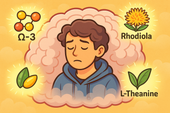
Brain Fog and Body Dysmorphic Disorder: Can Nootropic Supplements Help?
Brain fog often accompanies Body Dysmorphic Disorder, clouding focus and deepening emotional fatigue. Nootropic supplements like L-theanine, Rhodiola, and CoQ10 can help restore mental clarity, balance neurotransmitters, and bring calm energy back to the mind 🌿🧠.
-

How Stress Hormones Like Cortisol May Worsen Body Dysmorphic Disorder
Chronic stress floods the brain with cortisol — the hormone that keeps you on high alert. In Body Dysmorphic Disorder, this chemical overdrive fuels anxiety, distorts self-image, and traps the body in survival mode. Calming cortisol helps restore both peace and perspective 🌿🧠.
-

The Role of Neurotransmitters in BDD—and How Supplements May Help
Neurotransmitters like serotonin, dopamine, glutamate, and GABA shape how people with Body Dysmorphic Disorder perceive themselves. When these brain messengers fall out of balance, perception distorts — but targeted supplements can help restore calm, focus, and emotional regulation 🧠🌿.
-

What Is Body Dysmorphic Disorder? A Deeper Look at the Mind-Body Connection
Body Dysmorphic Disorder (BDD) isn’t just about appearance — it’s about perception. When brain chemistry, trauma, and stress distort self-image, the mind begins to see flaws that aren’t truly there. Healing starts by calming the nervous system and reconnecting mind and body 🪞🧠.
-

Keeping Calm in Competitive Sports: How to Train Your Mind, Body, and Chemistry for Peak Performance
Competitive pressure can overwhelm even the strongest athletes — but calm is trainable. By combining supplements like magnesium, L-theanine, and adaptogens with breathwork and mindset training, you can stay focused, balanced, and in control under any level of stress 🧠🏅.
-
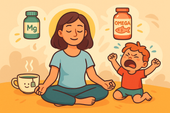
Supplements for Parents Facing Toddler Tantrums: Staying Calm When Little Emotions Run Wild
Toddler tantrums can drain even the most loving parent — but your calm is powerful. With the right supplements like magnesium, L-theanine, and ashwagandha supporting your nervous system, you can stay patient, grounded, and kind, even when emotions run high 🧸🌿.
-

Workplace Stress and Anger Management Support
Workplace stress can quickly turn into frustration — but calm is a skill you can train. By combining supplements like magnesium, L-theanine, and adaptogens with breathwork and mindset tools, you can stay focused, patient, and emotionally grounded no matter how intense the office gets 💼🌿.
-

How to Stay Patient With Family During Stressful Holidays
Holiday gatherings can stir up old stress and test your patience — but calm is possible. With nervous system support from magnesium, L-theanine, and adaptogens, plus mindful breathing and clear boundaries, you can stay centered, kind, and grounded even when family chaos unfolds 🎄💞.
-

Supplements to Keep Calm During Traffic Jams
Getting stuck in traffic doesn’t have to ruin your mood. With calming supplements like magnesium, L-theanine, and ashwagandha, you can train your body to stay relaxed and focused behind the wheel — turning gridlock into a moment of grounded patience 🚗🌿.
-
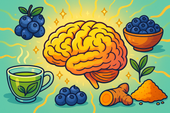
The Role of Antioxidants in Healing Brain Stress from Dissociation
Antioxidants protect the brain from the oxidative stress caused by trauma and dissociation. By neutralizing free radicals and supporting mitochondrial recovery, they help restore clarity, focus, and emotional balance — allowing the mind to heal at the cellular level 🌿🧠.
-
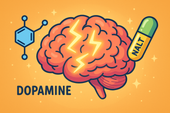
N-Acetyl L-Tyrosine (NALT) for Supporting Mental Clarity
N-Acetyl L-Tyrosine (NALT) fuels dopamine production — the neurotransmitter of focus and motivation. By supporting brain chemistry during stress, NALT helps restore mental clarity, energy, and alertness, making it easier to think clearly and feel present again ⚡🧠.
-

How Ginseng May Improve Focus and Energy in Dissociation
Ginseng helps combat the mental fatigue and fog that often come with dissociation. By supporting mitochondrial energy, balancing neurotransmitters, and regulating cortisol, it gently restores focus, motivation, and emotional presence — helping the mind reconnect with clarity and strength 🌿⚡.
-
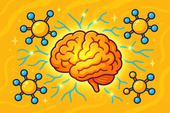
Phosphatidylserine and Dissociation: Supporting Cognitive Function
Phosphatidylserine helps calm the stress response by balancing cortisol, the body’s primary stress hormone. By lowering cortisol spikes, it protects memory, focus, and emotional stability — restoring clarity and mental presence for those struggling with dissociation 🧠🌿.
-
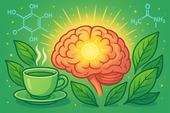
Can Green Tea Extract Help with Dissociative Brain Fog?
Green tea extract may help lift dissociative brain fog by supporting neurotransmitter balance, reducing inflammation, and enhancing energy at the cellular level. With its key compounds EGCG and L-theanine, it promotes calm focus, clarity, and emotional presence — helping you feel more alert and grounded 🍵🧠.
-
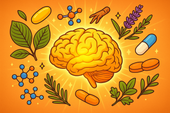
Building a Natural Supplement Stack for Dissociation Support
Building a supplement stack for dissociation means nourishing the brain and body back into communication. By supporting neurotransmitters, gut health, and energy balance through nutrients like magnesium, omega-3s, curcumin, and probiotics, you can help restore clarity, calm, and connection — one layer at a time 🌿🧠.
-

Chamomile and Lavender for Dissociative Anxiety Relief
Chamomile and lavender work together to calm dissociative anxiety by soothing the nervous system and restoring emotional safety. Their natural compounds balance cortisol, enhance GABA activity, and activate the vagus nerve — helping you feel grounded, connected, and at peace again 🌿💜.
-
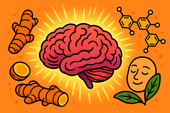
Curcumin for Inflammation and Mental Clarity in Dissociation
Curcumin, the golden compound in turmeric, does more than fight inflammation — it helps clear the mental fog often tied to dissociation. By calming neuroinflammation, balancing neurotransmitters, and supporting mitochondrial energy, curcumin can restore mental clarity, focus, and emotional presence 🌿🧠.
-
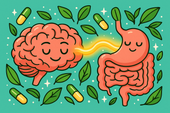
Probiotics and Dissociation: Exploring the Gut–Brain Axis
The gut–brain axis plays a vital role in emotional awareness and presence. When the microbiome is balanced, it supports serotonin production, vagus nerve activity, and calm focus. Probiotics help repair this connection — restoring safety, clarity, and the feeling of truly being in your body again 🌿🧠.
-
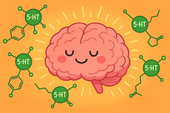
5-HTP for Dissociation: Supporting Serotonin and Emotional Stability
5-HTP helps bridge the gap between emotional numbness and stability by supporting serotonin production — the neurotransmitter that shapes mood, sleep, and sensory awareness. For people experiencing dissociation, 5-HTP may gently restore connection, presence, and emotional balance from the inside out 🌿🧠.


















































